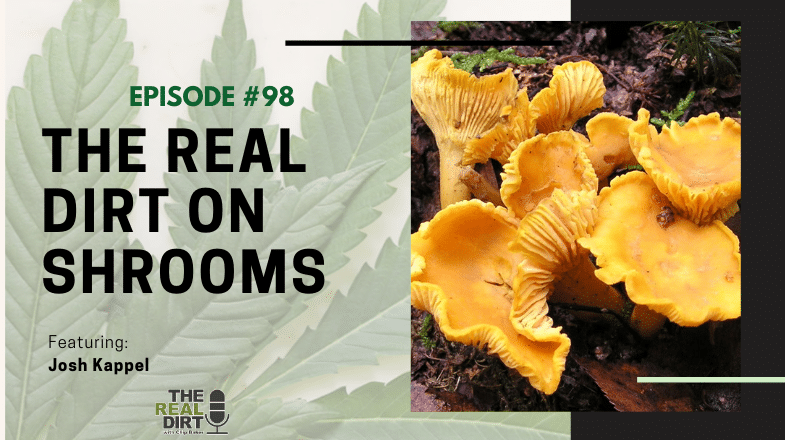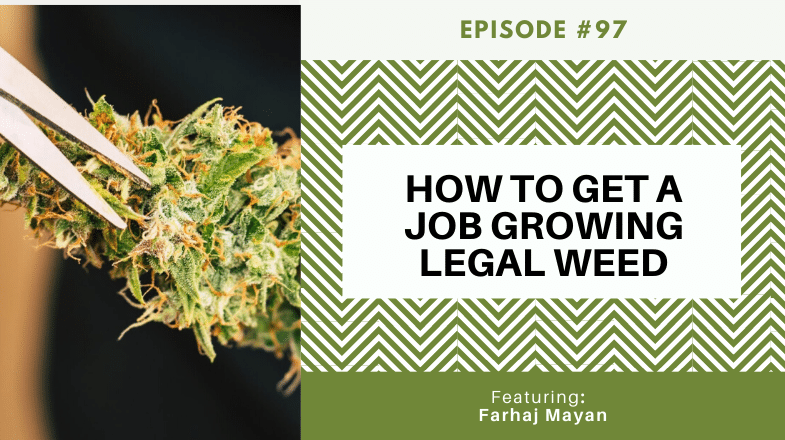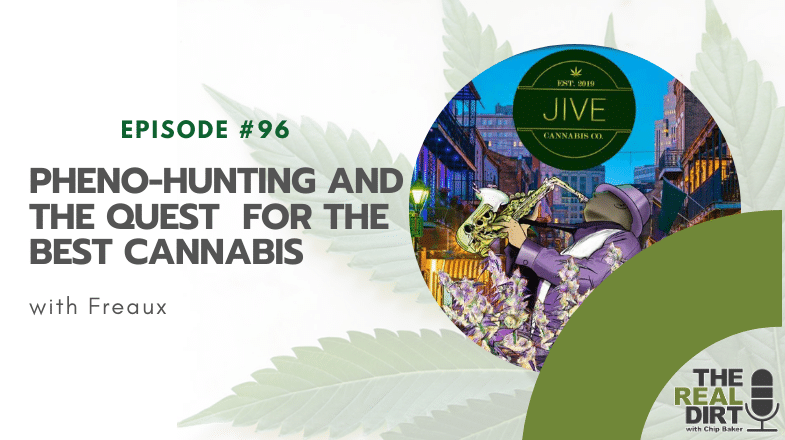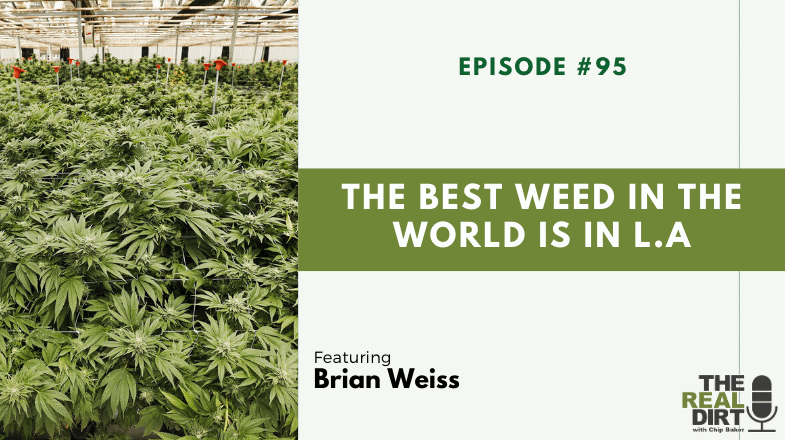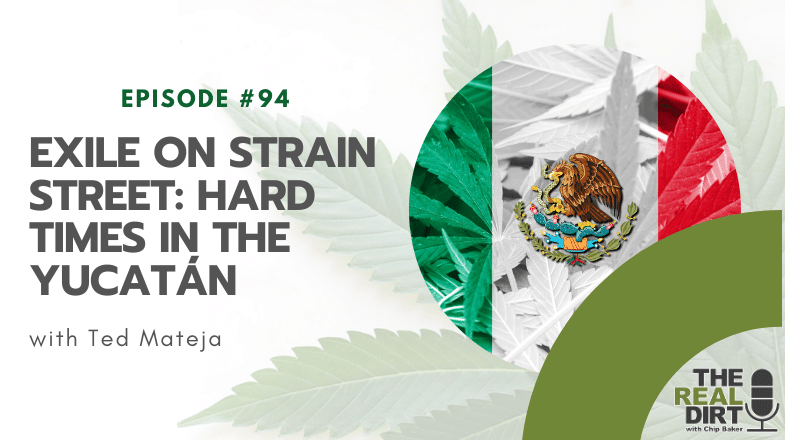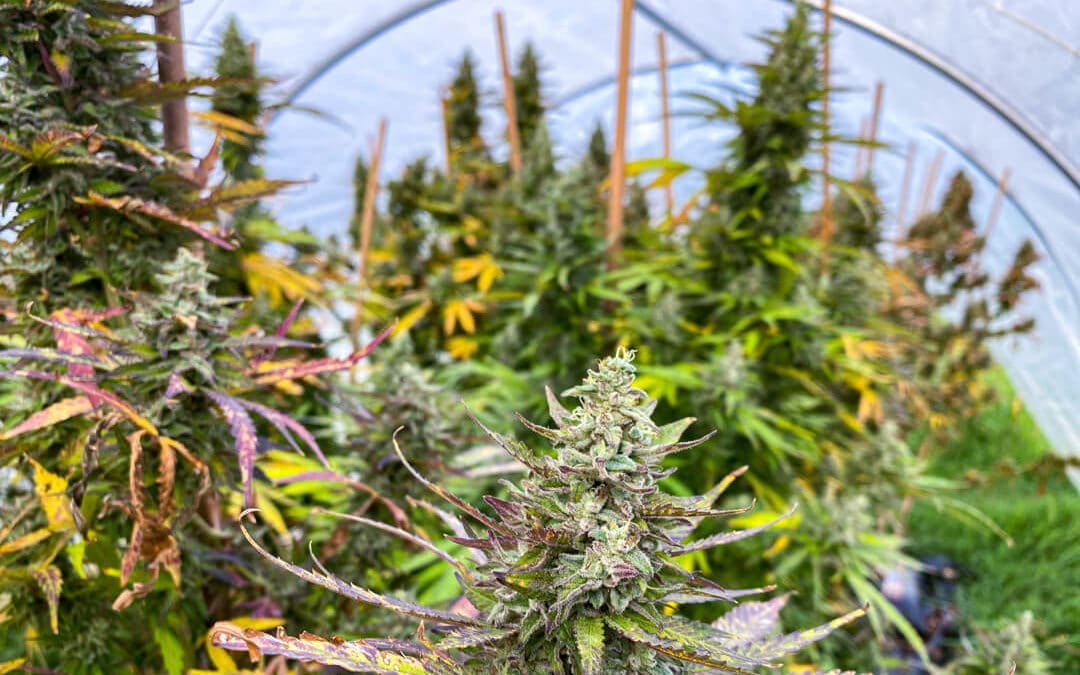
The Real Dirt on Oklahoma Cannabis
Podcast: Play in new window | Embed
Subscribe: Google Podcasts | Spotify | iHeartRadio | Stitcher | Email | TuneIn | RSS
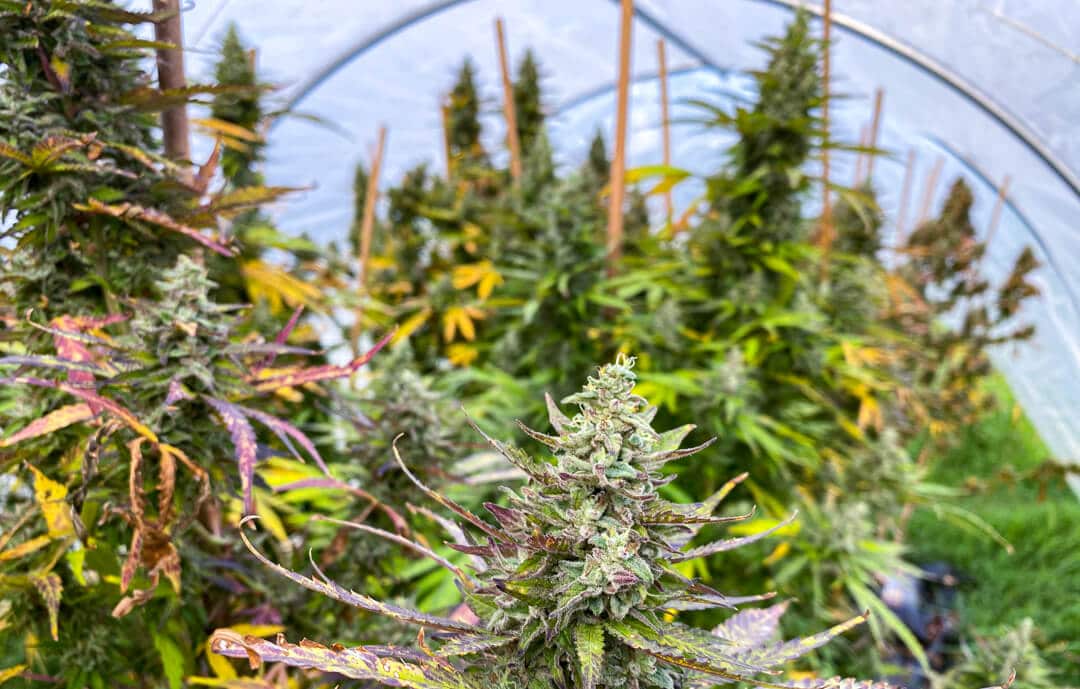
Oklahoma ain’t no joke when it comes to cannabis cultivation.
Chip has been living in Oklahoma for the last year, and has gotten to experience first hand the trials and tribulations of cannabis cultivation in Oklahoma.
Since legalizing medical cannabis in 2019, Oklahoma has exploded with cultivators, dispensaries and license holders. In fact, Chip argues that Oklahoma holds more licenses than every other state combined. When it comes to Cultivation, Nevada might have Oklahoma beat. But for total licenses including processing and dispensary licenses, Oklahoma sits at the top.
This week’s episode of The Real Dirt is a catch-up for our listeners on why The Real Dirt has been away for a while and what Chip has been up to in Oklahoma. Here’s your hint: it involves growing a lot of ganja.
Plus Chip gets into the dirty details about the pros and cons of growing in Oklahoma, how the industry there compares to California and Colorado, and why he thinks Oklahoma is a great place to grow cannabis.
[Transcript Below]
Stream on Apple Music
Stream on Spotify
Stream on Stitcher
Follow us on Instagram
Join our Facebook GROUP!
Some Topics We Discussed Include (Timestamp)
4:07 – Growing cannabis in Oklahoma
11:13 – Outdoor cultivation in Oklahoma
18:05 – The pest pressure
21:04 – Preventive measures for infestation
27:58 – Challenges in growing in OKC
People Mentioned / Resources
Connect with Chip Baker
TRANSCRIPT
Chip Baker: This is Chip from The Real Dirt. Once again, you’ve reached another fabulous episode of The Real Dirt with Chip Baker. I’ve been a little slack lately guys, and I want to start the episode off by just, oh mankind of apologizing and also just a little we’re all in this COVID scenario together and it’s just kind of been a little difficult to put out some podcasts. We tried to do some zoom recordings, but man, if you guys heard those or saw those, they just sound awful. And you know, I really liked the sound. It was incredible.
We put a lot of work into the post-production and into the overall production of the show in the past and Wow, man, that zoom connection just didn’t quite work for me, maybe really easy to do it. But we’re going to try to get some more audio episodes going here and maybe change a little format a bit. You know, it’s hard. Previously we’ve had like the past three years on The Real Dirt podcast. If you’re just new to the podcast, go check out some of our older episodes on iTunes or Spotify, The Real Dirt podcast, please subscribe. You can get some old material that’s new to you.
We spent an incredible amount of time doing production and really learning how to make a great quality podcast. When COVID hit, we went to zoom recordings partially because we didn’t want to, we couldn’t be close enough with people to make a podcast. Now regardless if you think this is an epidemic plan Dimmick, fake or real, I’m a pilot, private pilot. And the first thing that I really learned in aviation is, if you take chances, odds are you’re going to die. So aviation is always about being perfect and correct. And even though there is a feel to it, there’s a considerable amount of math and exact and preciseness to everything with aviation. But the big thing is don’t take chances on, and you know, I’ve put that in my life, my business, and that’s what we decided to do with COVID, too.
We thought we could just have a radio, just phone interviews or zoom interviews, and man, it just hasn’t really worked out. So I’m sorry, I had anticipated putting out about 25 episodes by now, 50 episodes by now, and I think we got 12 or 13 in the can so pretty much failed on that one. But you know, we got to, wanted to crank it up today, and have a little porch session on Sunday is often a relaxing day for us. As many of you know, we now live in Oklahoma. Previously we lived in Northern California for about 25 years 20 years, and on and off still it spent a good amount of time back there I love the place, and you know we moved to Colorado and set up some great grow stores Cultivate Colorado, Cultivate Garden Supply and moved down here to Oklahoma this past year to kind of do the same thing. Expand the grow shops, expand Cultivate Garden Supply, expand distribution of my potting soil growers, coco growers soil and in Oklahoma has been really really really really great for us. But you know, it’s a unique environment.
Growing Cannabis in Oklahoma
And we’ve learned stuff everywhere we’ve gone and grown in the country in the world about cannabis and how it performs. And Oklahoma has its unique set of challenges and advantages. And you know, we were learning every day. I was on Oklahoma medical patients thread the other day on Facebook. And someone was commenting on maybe all the bad weed is because all the bad growers and there’s a lot of novices and new growers here in Oklahoma, I definitely don’t think it’s all bad weed, but people are really just learning how to do it. And we don’t really have the culture here in Oklahoma. The ganja smoking West Coast, Colorado culture, it is a little different here.
But people will get better at the craft, and they will learn, and honestly, I think Oklahoma is really set to produce some fine quality weed in two or three years from now when all of the smaller growers have had a little bit of success, and they’ve gotten better, and they started talking to their friends, and they’ve seen better weed, and they’ve sold more medical cannabis in the shops and the shops tell them what they want and local genetic starts to develop, or local cultivars become in demand. When all those things happen, better quality cannabis is going to get here.
But you know, the thing about cannabis is and in anything, is when you have multiple people working on the project, you get exponentially better, and in Oklahoma, there are more cultivation licenses than anyplace else in the country. Now, I would bet there’s more. I mean, someone could check that fact, if someone knows this fact, let’s hear it. But I don’t, I’m just going to make it up. Okay. I bet that there are more legal cultivation licenses in Oklahoma than in the rest of the country combined. That’s right.
There’s just a few thousand in California, like just a few thousand in Colorado, and those are the states we think about the most I don’t even think there’s 2000 in Oregon. So, there’s a considerable amount of people growing all at once learning all and what man they’re going to get exponentially better. As long as they dropped the grower ego and realized that they could, there’s probably someone doing it better than them they can probably do it better the exponential learning that’s going to happen over all those six 7000 commercial growers and when I say commercial growers here in Oklahoma you can have a two-light grow and be a commercial grower you just apply for the license it’s a great environment to work that in.
So I think it is going to get considerably better and fast and in a couple years Wow, man, Oklahoma’s going to have some great weed. So besides the sheer number of new people to this industry, there are a lot of experienced people like myself that have moved here, and I’ve been growing cannabis all my life and only recently got back into medical cannabis. It is a difficult environment in many aspects. I mean, I’m from Georgia where the humidity is high every single day you know there’s not a dried day in the year. It’s subtropical down there. The humidity is not as bad here as in Georgia. I mean at our farm, we have 50% average humidity frequently. And 50% humidity 90 degrees temperature and for outdoors and that’s a really great environment for ganja plants.
They really like that. Yes, so does the mold. The mold and mildew start to grow at that 40 to 50%. It’s the perfect environment for it, but it’s also the perfect environment for cannabis to thrive. And from my experience, the terpene levels of the outdoor greenhouse cannabis here are far superior to what I’ve seen in Colorado simply because it’s just so dry. It’s just so dry. Yes there are days like today where the humidity is high. It’s been raining the past few afternoons and the humidity has gotten high at night. In the 70s you know the state is very diverse though and you know if you’re on the eastern side, east of Oklahoma City far more water, far more moisture.
If you’re on the western side of Oklahoma City, far drier way more high plains. And right in the middle, you get a lot of rolling hills, and there is lots of farmland where vegetables are grown. And there’s even some sort of grape and an olive culture here in Oklahoma too, which are indicator species for cannabis. So you know, the humidity is not impossible here, and I’ll tell you if you think the humidity is impossible to grow cannabis in, while Florida has quite a large cannabis industry currently, and you know, they have their difficulties, but they’re able to do it, and it’s totally possible not only possible.
But honestly, cannabis likes those 40-50% humidity ranges, and that’s what it is in the coastal areas of Humboldt and Oregon too, or Colorado, California, and Oregon is in the coastal areas you get that perfect 40% humidity and yeah rages a little bit at night, but that’s the kind of the beauty over there is it drilled consistently in temperature might only drop a few degrees. The daytime to the nighttime makes an incredible, incredible cannabis growth. That’s what y’all those huge, huge, huge plants you see those are West Coast plans. Rarely do you see any other plants like that in other areas, even though I have seen some large plants in Michigan, the same large plants.
Outdoor Cultivation in Oklahoma
The big thing about outdoor cultivation here in Oklahoma is latitude like we are so low down here that our light cycle is completely different from all of our strains. All the strains that we’re mostly getting are West Coast strains either bastardized in Colorado. Hey, I don’t mean to hurt feelings. One often Colorado and you know, Colorado has its own special element too, but they’re almost all indoor. The West Coast has so much outdoor that if strangers developed there, they’re often we’ll go outside or greenhouse or light up you know, regardless were like the Colorado strains they may never see that or may never see it at volume.
Wow, man, these strains. Most of the clones most of the seeds have a really different reaction down here than they do up at the 38 to 41st degree north, plants grow in that latitude. It goes all the way across to like Afghanistan, India, we were all on this ride that same ridge and the light cycles just kind of perfect for cannabis in that region. Right, you can plan it. There’s long enough light in the early spring in order to get the plant to vegetative growth. The summer has the right amount of light. Also, to keep it in bed into, you know, August, mid-August, and then it’ll initiate a flower. Initiate flower.
Now the interesting thing is this is all like in 30 minutes, 45 minutes of darkness that’s going on because that’s how cannabis flowers are darkness. So it’s just, you know, a few minutes more light, a few minutes later or a few minutes more like a few minutes earlier, it really does affect the plants that were growing the genetic stock we have, which I think is a huge opportunity for Oklahoma. Don’t get me wrong, mostly the plants aren’t growing and traditional veggies and flowering manners that we’ve seen at higher latitudes. Even in Colorado, the plants act really similar. They’re a little earlier. And here’s what I mean, so, the farther South you go, the earlier your season starts to begin, but also the earlier it ends even if you have good weather.
This is due to the fact that cannabis is mostly you know flower by light cycle, night cycle specifically, and I found that most cannabis will flower at under 14 and a half hours of light. You get under that, and most of the modern cannabis will flower. Now I know there are some people out there that are claim all this other stuff about photoperiod cannabis, but I’ve just been growing this stuff my whole life you know, it’s there’s absolutely a critical nightlife for every single strain and then there’s also a series of stressful or events that can also cause the plant to go into flower when it’s around that critical nightlight. For instance, if you’re in a one-gallon pot and you’ve got a four-foot tall plant, and it’s in early July here, it will probably flower. I would even say in late June, and it will probably flower due to stress factors of being in that root bound small pot and light cycles changing. It’s right there on the cusp. Right.
Mostly what we see here in Oklahoma is that you can plant outside two to four weeks earlier than you know we would have in Northern California. And that also the plants are coming out two to four weeks earlier in the fall time. There are tremendous advantages to all of this, Oklahoma, and there’s no canopy size, no plant size, you just get your limit and go under your regulations of security and fencing. And you can grow as many plants as you want. So, the idea is I’m going to grow these huge 5-10 pound plants, you know, no one it’s really unrealistic here in Oklahoma. And honestly, in other places, it’s just such a pain in the ass to grow those big plants. That small plants are definitely the way to go here. I would bet the quarter half, the quarter and a half-pound plants the one pound plants are probably perfect for this environment.
It’s so nice here early in the spring that so many people want to put clones and plants out. I mean, we had our first harvest of tomatoes in April. Before April 20th, we were eating tomatoes and cabbage and chard and onions. And I mean you know, it’s we started growing in February here our vegetable garden but that light cycles just off. But it does offer you an opportunity in the early spring just to put plants out and flower them immediately without them growing you get a sea of green outside. You don’t have to tarp it with the natural light cycle. And in many strains, you can force flowers by just bending them under 24 hours of flight and then putting them outside in that early spring. You know, I would suggest March is probably the best month for this in some strains just won’t work, but you know, we’ve seen like several strains just start flowering and not stop here. And of course, those are probably bad also for full season planted production here and in Oklahoma.
The Pest Pressure
The other real limiting factor here that’s been brought up is the pest pressure. And I mean the pest pressure is pretty, pretty strong here. But it’s not undoable for outdoor cultivation and for indoor cultivation, but for outdoor cultivation, you’ve got a series of pests that want to devour your plants every day. I mean, there’s rabbits and rats and deer and mice and grasshoppers and looper worms, cabbage worms, tomato, hookworms, tomato worms, garden worms. I mean, these guys are so destructive, it’s unreal. There’s definitely powdery mildew, and you know botrytis as well like you know there’s more humid down here you get those big buds, and those big, dense buds and the botrytis likes to grow inside them.
So there are numerous problems, but man, all those things I just mentioned are really you can control them. Numerous biological products you can get at cultivatecolorado.com and cultivateokc.com or go to your local supply store. DiPel is a bt product, almost any bt product I think works. DiPel is considered like the commercial one is what people use for you know, corn and whatnot. We mix it at a really strong rate far stronger than they call for it. I don’t think you can overdo it with the DiPel because you are just colonizing, you know, the [inaudible], I think, is the BT. So the more you spray, the more volume that you put in per gallon, just, in my opinion, increases your, the ability for the bt to grow on the planet.
You know, you’ve really got to get this stuff early too, you really want to get it growing on the stem, you know, early on the plant’s growth, you want to make sure that it’s on that first little bitty flower that comes out in pre flower. I would suggest you know, making sure you got a really good collonation started a week or two before flowers—great, great, great strategy. You can hear the wildness here, huh, man, lots of bugs. Hear them, grasshoppers, they haven’t been terrible much of a problem for us, but grasshoppers will also eat all the leaves off your plant, so they are locusts.
Preventive Measures for Infestation
We try to do a lot of mechanical control for IPM. We make sure all the grass is cut, we till as much of the ground, we disk as much of the ground around our outdoor gardens as we can. And we do these organic preventative sprays in it. It really does help, and they’re also like the things that you can use that aren’t harmful that you know don’t show up, in the end, use cannabis products. You have to do and preventatively though you can’t just start seeing the problem and spraying, and it’ll never work. You know that goes for powdery mildew. We suggest people spray regalia for that and just start your plants. Young and you won’t have a problem. If you see it, then you’re going to be battling it. And that’s, you know, that’s just how it goes. Every state differs on what pesticide products they can use or pest control measures they can use.
Oklahoma’s, it’s actually pretty strict when you actually look at the letter of the law or talk to the Department of Agriculture, but just the way they test for it isn’t strict enough. So it allows for lots of variation and a lot of variables. People have all kinds of strategies on how to use certain pest control method measures that won’t test, and they’re in test, and I don’t suggest or advocate any of that just, you know, try to follow the law and have a proper Integrated Pest Management Program, which always includes these elements. Mechanical, well identification.
One, you got to identify what you got. Okay? And it’s not that hard. You don’t have to like to get to the encyclopedia. You just Google it, you got to think about it. More than likely, if it’s a soft-bodied insect, you can treat it all the same way. If it’s a hard-bodied insect, you are treated kind of all the same way. You know, we like the biological controls. I won’t even get into the pronunciation of everything. But botanic guard and DiPel are some of our favorites. You can get all these cultivatecolorado.com online, just look us up, give us a call, Cultivate Colorado, Cultivate OKC just walk into the store and say, Hey, Chip said I need to come and get some DiPel because I’m going to have worms grown out of my buds here in the next month. Can you help me out, and Chris will say Oh, yeah, bro. I got a packet of DiPel right over here. We’ll be glad to help you out, show you how to spray it appropriately.
But right now is absolutely the time to get on that DiPel and get on your biological controls for flower production. I can’t say it enough, man do preventative measures. And the best preventative measure is identification to walk through your gardens. Look, if you think you got a problem, look at it, don’t overanalyze it, but think about it and then say hey man, I do have a problem here. And I need to control it and then use the identify the proper controls, we always suggest mechanically, and that is absolutely the number one thing to do. If you have one plant that’s riddled with the infestation of something, just kill the plant and get it out, man. As soon as you see a leaf or a plant that has bugs like, man, start thinking about it now. I’m not saying go chop your garden down, even though I have more than once, and I just recently did it too. You can easily control outbreaks of many different types of pests with just removing the worst plants in your garden, trimming back all the leaves of the infected areas of the other plants. One it reduces the overall surface area so that when you do some sort of biological control, then you have less surface area to spray.
Then lastly, is the biological control now whether what method you use to kill the bugs, it’s all you know, you’re all just trying to disturb their biology or disrupt their life cycle. I suggest trying to stick to all organic methods, or methods involving bacterias or other molds to combat the problems. Other things that many people use are H2O2 where botrytis or powdery mildew are concerned. With a direct spray, a spot spray directly on the affected area works excellent. I don’t suggest dipping your plants in it after you harvest it. It just harms the color of the look, the taste, all of it. I mean, H2O2 is caustic, and you can see it when you put it on your skin. It turns white; it does the same thing to your nuggets except it just turns on brown.
So if you need, if you’re concerned about botrytis, man, it’s actually better to spray the plants down a few days before you harvest it. Let it dry completely in the plant-like absorb it. Far better off doing that. So identification, mechanical and biological controls, that’s how you deal with almost any pests. If you have any questions, you can always call us up at Cultivate Colorado, Cultivate OKC, chat with us online, ask online join our Facebook group, and we’d be glad to help you.
Oh man, Oklahoma is windy. Oh yeah, it’s windy here. It’s windy here in Oklahoma. Now some places aren’t as windy as others, but those places had the humidity. So if you want the lower humidity, then you’re going to have to suffer through a little bit of wind, and I picked kind of a ridge location for our farm specifically because we came through here when was flooding last year and all the places that weren’t flooding, well, those are probably going to be pretty good places.
Challenges in Growing Cannabis in OKC
In the place we got, the farm we got a real real good farm, but it is a little windy. Not as windy as others, not as windy as being in the South or on the plains out there, West of Oklahoma. But the wind is definitely an issue. You definitely have to stake up your plants take up your pots, make sure you really double pot down your greenhouses like you really have to go through the effort, you’re more of a mariner here I think with all the wind and the rope and the knots and the like bracing then you are farmer almost. The things you’ve done to combat the wind, greenhouses, shade houses, big plants in front of small plants, perimeter fencing using tree lines to break the wind like we’ve taken a number of strategies to make this work and it has to some degree. But man, you know when it’s 114 degrees, and that wind picks up wow you better be on your irrigation man because it will melt some plants. Stray, melt them.
So I mean it’s definitely a difficulty to overcome, but it’s part of the game, and every place you go has its own set of rules or its own circumstances, and here in Oklahoma there is the wind and the heat is definitely two of the major ones that’s for sure. But Amen, people have been breaking wind, haha. People have been disturbing wind flow using wind blocks of some sort for millennia.
The other problem we’ve had here in Oklahoma is getting good employees man getting good people that can work. We came here last year and man there’s only a handful of cannabis people here, to begin with. Most of the people here are new to cannabis. Some of them just don’t know if they want to be in it or can do it. And we’ve had a little bit of a problem finding employees. So hey, if you’re in Oklahoma, if you are fit and willing to work outside in a greenhouse, outdoor environment, man, you know drop us a lineman. You can email me at chip@chipbaker.com. And we’ve been taking resumes and applications for a moment. But we’re really looking for some good people that want to learn about the operation, workup and stay with us for a number of years. That’s generally how we do all of our operations.
In Cultivate Colorado, I got people to work with me for ten years. Cultivate OKC, I mean, Chris has worked with me for more than ten years. Overall, Chris helped me develop all the product lines, they helped me source all the raw materials, they’re using and all the testing and now he’s the manager at Cultivate OKC. So yeah, if you’re interested in employment, if you’re interested in being part of a great team, just drop me an email chip@chipbaker.com. I am specifically looking for hard workers people with backgrounds in mechanics and electrical and construction and irrigation and farming, vegetable farming, yeah give me a call, if you’re interested, man, we’re good people and we want to bring some great people on.
Well, that’s about it for today’s Real Dirt Sunday edition. It’s a sun starting to come out now we have a nice bog later this morning, so it’s getting hot here on the porch. You’ve heard all the birds and the roosters and other insects in the background, a little piece of Oklahoma. If you liked this episode and others, please download and subscribe, go to iTunes right now, look up The Real Dirt podcast and subscribe.
Hey, I want you to check out all of my websites. If you’re interested in coco fiber, man, growersoil.com. We make the stuff in Colorado is the highest quality coco fiber potting soil on the planet. I put my heart and soul and wallet behind that statement. We all made inside it treated it like a bakery. Everything’s broken out, manufactured in one day and patched up the end of the chance for cross-contamination and bugs is almost minimal. I mean, it is fresher than a hostess pie when you get it that’s for sure. Cultivate Colorado, Cultivate OKC, Cultivate Garden Supply, cultivatecolorado.com. You can order anything you wish for your hydroponic indoor-outdoor garden local deliveries throughout Colorado and Oklahoma commercial deliveries throughout the known world.
For instance, man, we just had a deal going on in like Malawi, or someplace like that. And you know, everybody was a little nervous about it. But yeah, we got a good shipment of stuff shipped over there and helped some hemp farmers get started, man. Hey, I also wanted you to check out my new project, The Greener Consulting Group. I’ve developed a consulting group, The Greener Group, it is an accumulation or it is a team of the top experts in the industry and we can solve anyone’s problem if you’re having if you’re going into the cannabis industry. Man, you should really think about talking to us about a two day deep dive. If you’re in the cannabis industry and you’re having some problems with it, it doesn’t matter if it’s banking or IPM or umpiring, or I’ve got an expert that can help you out. And it’s really really, really reasonable. You’ll learn more in a day spent with us than you will in 5-10 years failing at it on your own.
So, a great place to stop growers group, growersconsultinggroup.com. Of course, I have to mention bakersmedical.com, our Oklahoma dispensary and cannabis operations where we operate a clone nursery, a commercial clone nursery, and a dispensary. The dispensary has been closed for a minute but opens soon. Hey, I want to thank everyone for listening. I appreciate all your help and support. We’ll get a couple more of these porch episodes going and maybe get more real dirt on some more stuff. Real Dirt!
Subscribe & Review
Thank you for tuning in to this episode of The Real Dirt. Don’t miss an episode, click here to subscribe on iTunes and let me know what you love about this show.
Podcast: Play in new window | Embed
Subscribe: Google Podcasts | Spotify | iHeartRadio | Stitcher | Email | TuneIn | RSS

